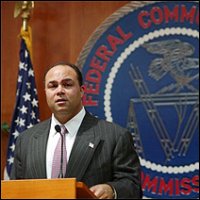September 09, 2004
Small ISPs vs. the FCC & Big Cable: In Broadband Era Cable Network Access is Fundamental to Survival
 Small ISPs just can’t buy a break like big cable companies can. The FCC came out in favor of protecting monopoly access to cable networks from what are sure to be deflationary competitive pressure from small ISPs that cannot otherwise provide non-DSL based broadband access to customers.
Small ISPs just can’t buy a break like big cable companies can. The FCC came out in favor of protecting monopoly access to cable networks from what are sure to be deflationary competitive pressure from small ISPs that cannot otherwise provide non-DSL based broadband access to customers.
-
Small businesses looking for more broadband choices are unlikely to get help from the Bush administration, which is taking a hands-off approach to cable regulation.
Despite a federal appeals court ruling overturning their decision, federal regulators are continuing to push their edict that cable companies, unlike telephone companies, do not have to give rival ISPs access to their lines at regulated rates. Administration officials last week asked the U.S. Supreme Court to review the matter.
The case pits the Federal Communications Commission against ISPs that say requiring cable operators to share their lines—much the way telecommunications companies are required to lease lines to competitors at set rates—would result in increased build-out of cable networks and more choices for consumers.
SMBs (small and midsize businesses) and home offices typically have two choices for broadband: cable and DSL. But while DSL offers myriad choices among ISPs, with cable there is typically just one option—the cable provider.
If the government supported access to the cable network by independent ISPs, cable companies would have an incentive to build their networks into downtown business districts, said Mike Jackman, executive director of the California ISP Association, in Sacramento.
"If you plan on being in business in five years, you might want to have the option of having cable," Jackman said.
FCC Chairman Michael Powell, meanwhile, lauded the administration for backing the FCC and asking for a Supreme Court review, arguing that if the appeals court's decision isn't reversed, regulatory burdens imposed on traditional telephone companies will have to be applied to cable companies as well.
"This is about ensuring that high-speed Internet connections aren't treated like what they're not: telephones," Powell said. "A successful appeal of this case would ultimately mean lower prices and better service for American consumers."
Independent ISPs disagree.
"If [Powell] could name me an instance where you had more competitors and prices rose, I would be very interested," Jackman said. "There's no technological reason why customers who choose cable shouldn't have a selection among hundreds of ISPs."
Although independent ISPs overall do not have regulated access to cable networks, they consider the issue imperative in the larger matter of broadband competition.
"We're talking about a philosophical battle here," Jackman said. "Do we want true competition, or are we going to give the market to two or three companies?"
ISPs are also concerned that the Supreme Court's review of the case could affect other areas of the broadband service industry. Anticipating that Congress will review the Telecommunications Act of 1996 and that it will face intense lobbying pressure from incumbent phone companies, ISP associations across the country have formed the National Internet Alliance, which plans to debut officially next week.
As a VoIP user running over cable, I’d argue cable companies are very much becoming telcos… plus, after having started a small ISP in the late 1990’s (since spun off, after serving its intended purpose of providing my own company with high-speed Internet access, back in the days before DSL/Cable), I can tell you that ISPs without broadband are sitting ducks.
Finally, having had my office in the only Wisconsin county (Barron, in the west central part of the state) with more than one cable company, I can tell you they tend to sharpen their pencil when the monopoly goes away. Our rates were approximately half that of surrounding counties.
- Arik
Posted by Arik Johnson at September 9, 2004 04:00 PM | TrackBack "Competitive Intelligence applies the lessons of competition and principles of intelligence to the need for every business to gain awareness and predictability of market risk and opportunity. By doing so, CI has the power to transform an enterprise from also-ran into a real winner, with agility enough to create and maintain sustainable competitive advantage."
"Competitive Intelligence applies the lessons of competition and principles of intelligence to the need for every business to gain awareness and predictability of market risk and opportunity. By doing so, CI has the power to transform an enterprise from also-ran into a real winner, with agility enough to create and maintain sustainable competitive advantage."
